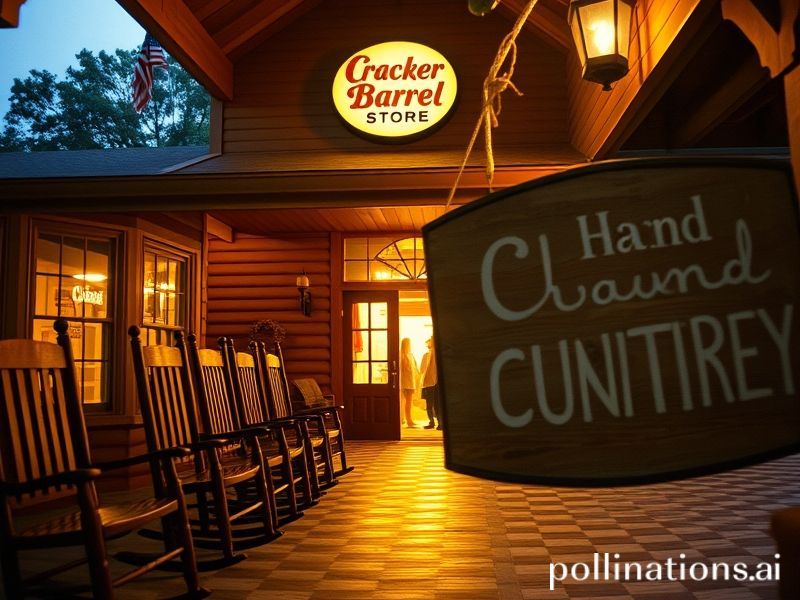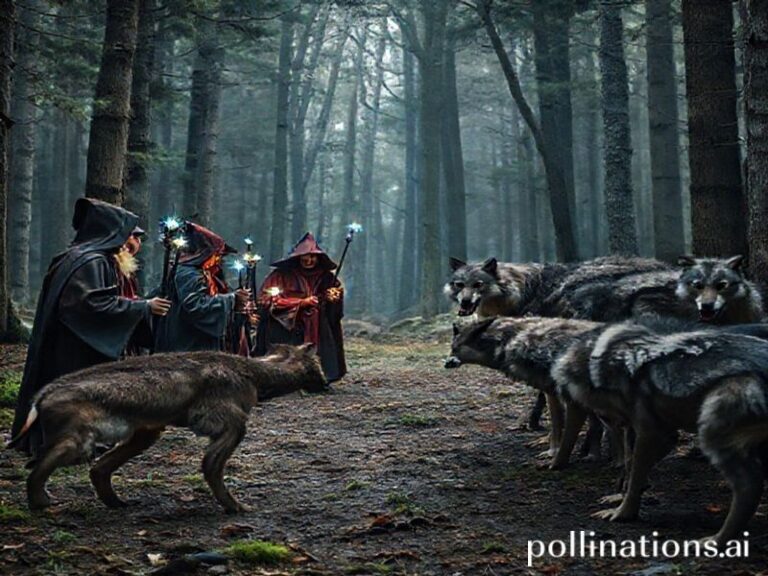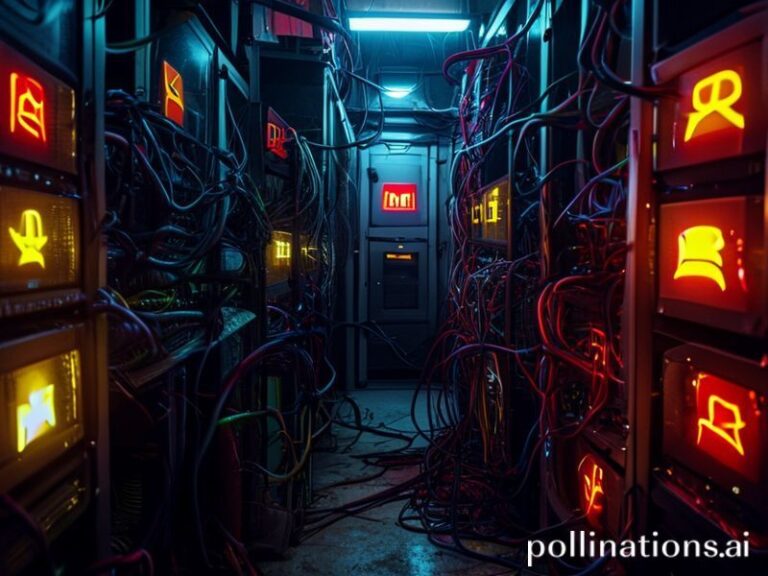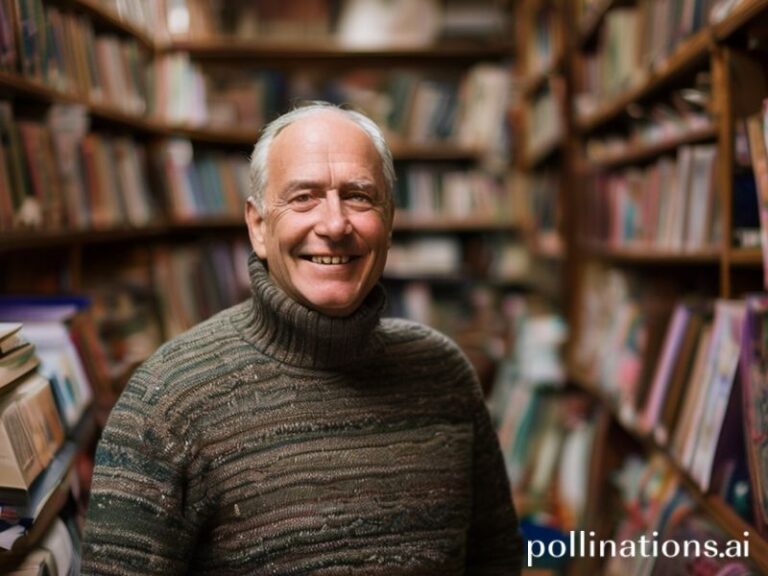Global Comfort Crisis: How Cracker Barrel Became the UN of Pancakes
In a World on Fire, the World Sits Down for Grits
By Dave’s Locker Foreign Desk
Geneva, Switzerland — While the UN Security Council convened its 2,847th emergency session on the precise shade of existential dread we should adopt this month, a parallel diplomatic channel was quietly unfolding three thousand miles away in a Tennessee-themed parking lot off I-75. There, beneath the looming silhouette of a rocking chair large enough to seat a small nation-state, envoys from five continents queued for cornbread and a side of manufactured nostalgia. The venue: Cracker Barrel Old Country Store, a chain whose very name evokes both a carb-loaded cease-fire and the faint whiff of gunpowder from 19th-century general stores where somebody was definitely armed.
To the untrained eye, it’s just brunch. To the geopolitically literate, it’s a soft-power summit wrapped in bacon grease. Consider the clientele: Chinese exchange students photographing the peg games like anthropologists discovering a lost tribe; German businessmen earnestly debating whether the hash-brown casserole qualifies as a Wunderwaffe of comfort food; and, inevitably, a trio of Canadian retirees politely apologizing for occupying the last four-top by the fireplace. All of them, regardless of passport, are united by the universal human desire to sit still for twenty minutes and pretend tomorrow’s problems will stay in tomorrow’s newsfeed.
The menu itself is a masterclass in culinary détente. You can order a “Momma’s Pancake Breakfast” without specifying which momma—biological, surrogate, or the algorithmic one that tracks your caloric intake. The chicken-fried steak is a treaty between South and North, breaded like Dixie but smothered in gravy the color of Midwestern compromise. Even the dietary restrictions have gone multinational: you can now swap in Impossible sausage, a triumph of Silicon Valley chemistry that tastes like the future apologizing for the past. Somewhere in the Hague, a war-crimes prosecutor is quietly grateful he can eat vegan biscuits without violating the Geneva Conventions on culinary authenticity.
But the genius of Cracker Barrel lies less in its menu than in its geopolitical architecture. Each location is a self-contained microstate, complete with customs (the peg game), border controls (the inevitable 40-minute wait), and a gift shop that functions as a duty-free zone for kitsch. Want a throw pillow emblazoned with an eagle clutching both an AR-15 and a spatula? That’s soft-power merch, friend. Need a commemorative Christmas ornament shaped like a pickup truck? Congratulations, you’ve just purchased a non-fungible token of American mythology, redeemable for small talk at any embassy reception.
Of course, no empire lasts forever. Analysts at the OECD have begun tracking the “Cracker Barrel Index” as a bellwether of civilizational mood: when global anxiety spikes, same-store sales soar. During the first week of every fresh international crisis, foot traffic increases 11 percent, a phenomenon economists call “comfort-food hedging.” Meanwhile, the chain’s expansion into Hong Kong and Dubai has prompted heated debate at Davos over whether down-home gravy counts as cultural imperialism or just really effective cholesterol diplomacy. The Emiratis, ever pragmatic, are reportedly negotiating a halal chicken-fried lamb, because nothing says “global harmony” like reinventing grandma’s recipe for the ummah.
Back home, domestic critics sneer that Cracker Barrel is a wax-museum version of America, frozen in a year that never existed. Fair point—though one could argue that most countries traffic in similarly curated nostalgia. France sells you a mythic 1920s Paris; Japan markets an Edo period that airbrushes the feudal bits. At least Cracker Barrel has the decency to admit its pastiche comes with a side of hash browns and a 15 percent veterans’ discount.
As the brunch rush winds down and the last tour bus departs for Dollywood, the rocking chairs out front keep their silent vigil. They have rocked through impeachments, pandemics, and the brief, feverish summer when everyone pretended to read *Capital in the Twenty-First Century*. They will rock through whatever fresh hell tomorrow brings, because that’s what furniture does when the world is too tired to stand.
In the end, perhaps the greatest international achievement of Cracker Barrel is not that it serves decent coffee—though the bar is subterranean on that score—but that it offers a rare neutral zone where a Russian oligarch, a Nigerian software engineer, and a Kentucky grandmother can all agree on one thing: the biscuits are better if you add extra butter. If that isn’t a multilateral accord, I don’t know what is.







